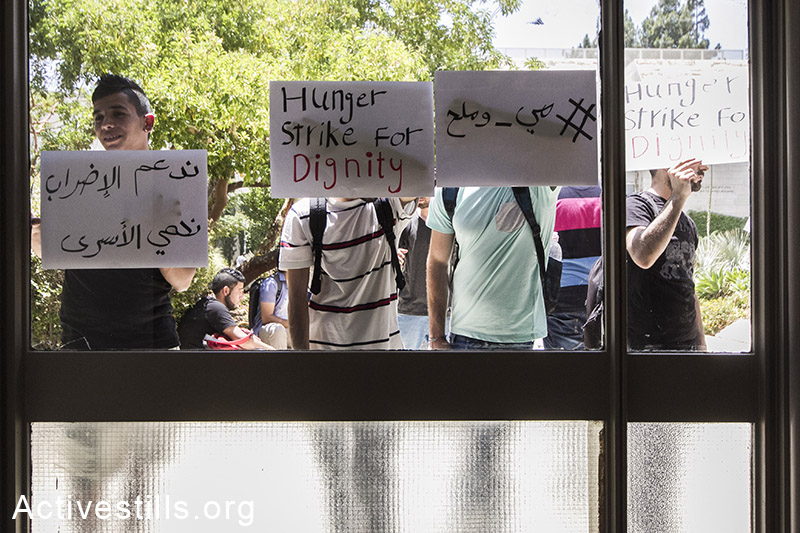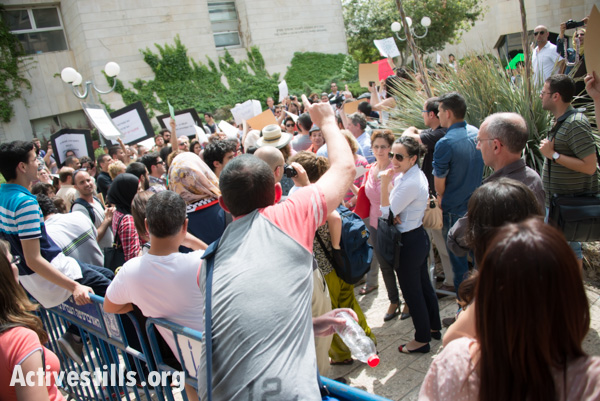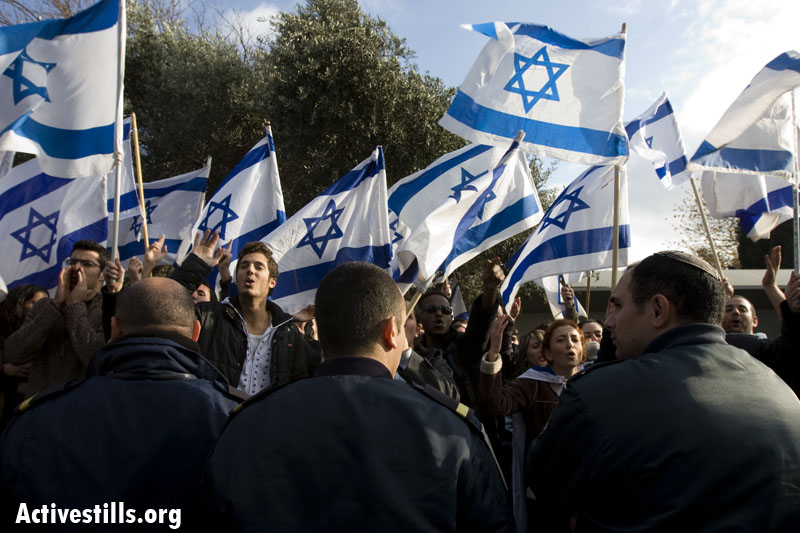Twelve Palestinian students are facing possible expulsion from Jerusalem’s Hebrew University for participating in an ‘illegal’ political protest. In the past, the university only took steps against particular student groups. Now, it’s switching gears and targeting individual students.
Near the end of September, 12 Palestinian students received a notice from the Hebrew University administration, stating that Dean of Students Udi Shavit had lodged a complaint against them over their participation in an “unauthorized demonstration that goes against regulations,” which took place on July 10, 2014. The notice said that the administration was waiting for a response from the students before it decides whether they will face a disciplinary committee. The students were then given seven days to respond to the claims, despite the fact that the contents of the complaint was never made clear to them. Should they be asked to stand before the committee, they would face possible suspension or expulsion from the university.
The event took place against the backdrop of the Palestinian prisoners hunger strike. At the time, many events and protests took place across the country and the world. The aforementioned event did not include a demonstration. A small number of students gathered spontaneously outside the “Forum” area of the Mt. Scopus campus, and expressed support for the hunger strikers and administrative detainees.

“It was definitely not a protest,” says Khalil Gharra, a 22-year-old philosophy and political science student, and one of the 12 who faces potential expulsion. “I have no idea who organized it. It was most likely a spontaneous gathering of a few people who came to protest against the conditions of Palestinian administrative detainees, and to support them in their hunger strike.”
According to the students, they did not know that the event was unauthorized or that it violated university regulations. “University security personnel arrived and moved us into a small area outside the entrance of the university. They did not inform us that the action was illegal. Actually, the opposite was true. The fact that they even moved us in the first place allowed for the gathering to continue, and gave other students the opportunity to join. This created the feeling that the event was legal and authorized,” says Gharra.
“Only later did the university claim that the event violated regulations and was unauthorized,” he adds.
This isn’t the first time that Hebrew University has been accused of limiting its Palestinian students’ freedom of speech. Gharra, like other students, believes this stems from targeted persecution. “This is a direct continuation of the past two years. The university made the same accusations after the Balad student group organized a cultural event at the Hadassah campus in June 2013. They said that Haneen Zoabi spoke without permission. This was totally false – she didn’t even speak. They just made up a reason to attack the group.”

“And it didn’t end there,” Gharra continues. “During a protest against the conscription of Christians into the army, which also took place in the Forum area, the university security called the police. The police arrived in huge numbers, along with undercover policemen dressed as Palestinian students. Students said that they saw security personnel hand out blue hats with the word “security” on them to the Jewish counter-protesters. Twelve students were arrested, including myself, after the police and security personnel used excessive force.”
Things get personal
Riham Nassra, a 24 year-old law student who is also facing possible expulsion, has no doubts: “We’re seeing a new strategy of individual complaints submitted by the dean. Until now, the complaints were submitted against Palestinian student groups, which lead to them being temporarily suspended. Balad was suspended, Hadash were harassed and threatened several times, and Palestinian students continued with their political activities in the student groups.”
What’s the difference between complaints against political student groups and individual complaints against students?
“There’s a big difference. The university saw that the student groups continue to function, while the students continued to demonstrate, so it simply moved toward personal deterrence. It is known that the consequences of facing a disciplinary committee can be disastrous for a student. In many cases it can end in suspension, probation or even expulsion. When you go after a student group, the harm is collective rather than personal. They probably think that personal targeting will serve as a more effective deterrence.”
What is really surprising about this entire story is both how exactly the university knew to identify those same students who were present at the gathering, and how it began taking action against them. Nassra has a feeling that the university is using new methods of harassment.
“They probably came prepared. They let us stay there, and allowed other passersby to join. Then they started implementing methods reminiscent of intelligence services, which do not show respect for an academic institute, in order to identify us.”

“And you know what? Out of the 16 or 17 students that were there on that day, 12 complaints were lodged against university students. That’s a majority of the people who were there. Most of the other students were likely not from the university, which means the university could not target them. This can definitely be seen as an attempt to cause innocent students to fall into a trap. The university takes no steps against the ‘Im Tirzu’ student group, which has been recognized as a racist group by an Israeli court, and whose members chant racist chants during protests against Arab student groups.”
The students have yet to receive dates for their disciplinary committees.
The university’s conduct raises many questions. Lately we have witnessed an unprecedented increase in harassment and targeting of Arab students in universities and colleges across Israel. However, in this case, at least according to the students, the transition from threatening a political body on campus to directly threatening the academic future of students runs contrary to the values of freedom of expression and freedom to protest. There is no doubt that this story will only harm the university’s reputation, as well as that of the Israeli academy, especially in light of growing international pressure to boycott Israeli universities.
Hebrew University responded to the allegations:
The students were summoned to the disciplinary committee after they organized a protest with no prior authorization, as is required by university procedures – an act that constitutes a violation of the university’s disciplinary rules. The university treats all of its students equally, and calls on every student to respect its regulations. The university will take action against any student who chooses to violate the regulations, regardless of national, religious or other affiliations.
This article was first on Local Call. Read it in Hebrew here.
Related:
Jerusalem police arrest Palestinian activist in his Hebrew U dorm
PHOTOS: Hebrew U. students protest pressure on Christians to join army
At Hebrew University, Arabic textbooks reflect a Zionist reality


